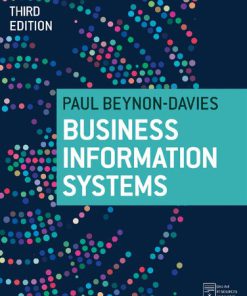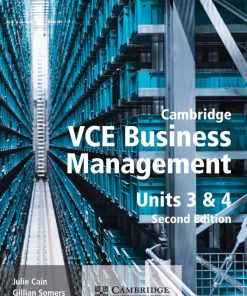Leading a Business School 1st Edition by Julie Davies, Howard Thomas, Eric Cornuel, Rolf D Cremer ISBN 9781000835830 1000835839
$50.00 Original price was: $50.00.$25.00Current price is: $25.00.

ISBN 10: 1000835839
ISBN 13: 9781000835830
Author: Julie Davies, Howard Thomas, Eric Cornuel, Rolf D Cremer
Leading a Business School 1st Edition Table of contents:
1 The Evolution of Management Education (1972–2022): EFMD’s Journey, Changes in Business Models and Deanship Roles
Introduction
Is There a Distinctive European Management Model?
The Timelines and Achievements in EFMD’s History
What Challenges for Management Education Were Identified after 25 Years of EFMD? What Roles Were Suggested for EFMD’s Future?
Embracing the Ideas and Principles of a Liberal Education
Focusing on Change Innovation and Entrepreneurship
Promoting Globalization and European Models of Management Education
Addressing the Realities of Competition, Growth and Strategic Change
Adapting to Societal/Stakeholder Perspectives
Recognizing that Inertia and Complacency May Create Failure
What Happened to Business Schools Following the Global Financial Crisis: Promises Fulfilled and Unfulfilled in Management Education
Who Are the Key Stakeholders in Management Education?
Which Issues Did Key Stakeholders Stress?
Information Technology (IT)
Subject Areas in Management Education
Globalization
The Role of Faculty
Competition and Performance
Summary of Interview Findings
Which Lessons Were Not Learned?
Can Deans/Leaders Change Management Education?
Using Open Innovation on Ourselves: The Global Business Education Jams and the Future Transformation and Change Options for Business Schools
Overview of the Business Education Jam
Conclusion
2 What Are Business School Deans Expected to Do?
Introduction
Vision, Mission and Values Statements
Job Titles
Job Descriptions and Person Specifications for Business School Deanships
Historical Accounts of Deanships
Multiple Perspectives on the Business School Deanship
Individual Perspectives and Models of the Deanship
University Constraints
National Context
Business School Industry Sector Influences
Societal Issues and Demands
Metaphors and Identity Transitions
Key Challenges
Metrics
Deanship: Defining Purpose, Legitimacy and Impact
Tenures and Career Trajectories
Trends in Management Education and the Future of Work
Prospects for the Business School Deanship
Conclusion
3 How Do Business School Deans Deal with Critical Incidents?
Introduction
The Case of Warwick Business School
Four Types of Critical Incidents
Rare External Events
Financial and Economic Crises
COVID-19 Pandemic
Climate Emergency
National Government Funding Cuts
Terrorist Attacks
Natural Disasters
National Border Lockdowns
Brexit
Archetypal Situations
Strategic Planning
Communicating
Business School Accreditation Events
Deans’ Dinners
Organizational Culture and Community Building
Hiring and Developing Talent
Forming the Dean’s Cabinet
Change Agency
Curriculum Development
Students’ Complaints
Facilities
Boundary Spanning
University Meetings and Issue Selling
Entrepreneurial Activities
Typical Events
Diary, Time and Energy Management
One Cannot Not Communicate
Deans’ Entries and Exits
Internal Shocks
Fraud Allegations
External Mergers Resulting from Insolvency
Internal Mergers
Retrenchment
Change Management
Personal Tragedies
Other Critical Incidents
Harassment, Racial and Gender Discrimination
Rankings Scandals
Faculty Suicides
Additional Challenges
Conclusion
4 How Do Deans Learn?
Introduction
Leadership Styles
Making Sense of the Business School Deanship
Deans’ Leader and Leadership Development
Relevant Life and Career Experiences
Deans as Lifelong Learners
Post Deanship
Conclusion
5 The Future of Business Schools and Management Education: Looking Back and Moving Forward
Introduction
Rankings, Dotcoms, Enron and the Aftermath of the Global Financial Crisis: What Challenges Were Faced by Business Schools?
‘Willingness to pay’
Competitive Pressures
Strategic Groups and Strategic Options for Business Schools
2019/20 Conclusions and the Calm before the Arrival of the Pandemic
Changes in Business School Models Post-Pandemic
Business School Responses
Conclusion: Rethinking Paradigms, Business School Futures and Model Innovation
Postscript: Recent Conversations, Debates and Dialogues about the Future of Management Education
Zero-Based Culture
Culture of the Business School
Academic Integrity and Learning Assessments
Market Segmentation Particularly in the MBA Market (and the Erosion of the Part-time Market)
Degree Programmes as a Core Product
Education Costs and the ‘Tuition Bubble’
People also search for Leading a Business School 1st Edition:
business school virginia
business school vs law school
business leadership vs business administration
leading business schools
business school vs college
Tags: Julie Davies, Howard Thomas, Eric Cornuel, Rolf D Cremer, Business School
You may also like…
Uncategorized
Outside In A Political Memoir 1st Edition by Libby Davies ISBN 1771134453 9781771134453
Computers - Programming
Continuous Delivery 2.0: Business-leading DevOps Essentials 1st Edition Qiao Liang
Computers - Applications & Software
Business & Economics - Responsibility and Business Ethics
Cambridge VCE Business Management Units 3 & 4 Second Edition Julie Cain
Children's Books - Literature & Fiction
A World Without Blue 1st editon by Monika Davies 1644914506 9781644914502
Computers - Programming
Learning R and Python for Business School Students 1st Edition Yuxing Yan
Business & Economics - Management & Leadership
Leading With Values: Strategies for Making Ethical Decisions in Business and Life Neil Malhotra











